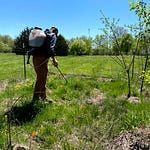This is the newsletter version of Sara by the Season, where I explore what is piquing my curiosity as I try to lean into nature’s wisdom and rhythms. You can listen to me read you the newsletter by hitting play above - or you can click the little link above and to the right to play in your favorite podcast player.
If you know someone who would like this sort of thing, I’d be so grateful if you would share it.
Our children are 14 and 11. My husband, Grant, and I increasingly find ourselves listening to podcasts and reading books about raising teenagers, what’s going on with their mental health, how best to support them, etc. I think we’re both beginning to freak out a bit about them leaving the nest because, at least for the oldest, I can feel his time under our roof dwindling. Over the last several weeks, I also listened to Dr. Becky’s Good Inside: A Guide to Becoming the Parent You Want to Be. Dr. Becky is like the it Instagram parenting therapist. She is on most of the podcasts that I love, and people I follow are always resharing her stuff. Listening to her book regularly made me cry at the thought of being raised the way she was describing. I love the premise of her book: that we’re all - parents and children alike - good inside and at our core1.
And. She annoys the crap out of me.
For many of us parents right now, we have learned SO MUCH in the last twenty years or so since we became adults2 about how our brains work, attachments styles, personality types and disorders, emotional immaturity, what trauma even is and how it affects people (especially children). There is so much more information at our fingertips. Many of us have woken up to our own internalized racism, misogyny, and have had to come to terms with the sins of colonialism and capitalism. During the last 20-30 years, therapy became destigmatized (hooray, seriously) and most of us have been to a therapist at some point in our lives3.
Many of us are doing what I call The Work, which is this all-encompassing phrase that I use as an umbrella term for all of the stuff we do to learn more about ourselves, what activates us, and how best to regulate ourselves, as well as simultaneously unlearning the cultural, religious, and familial harmful and sometimes even toxic patterns that we were raised immersed in. But most of us weren’t parented by people that were doing all that work when they were raising us. To be very clear: I don’t blame our parents. They had very little of the knowledge about development, emotional regulation, and relationships that we have today, little if any access to the types of tools that we have to support us today, and therapy was something people did as only the last possible resort. But what has been true for millennia is that parents generally parent how they were parented. Even though we all say that we’re going to do things differently than our parents did, most of us unconsciously fall into parenting in the same ways that our parents raised us, except in cases of addiction, abuse, and other traumas which spur the next generation to break the cycle in some way.
What that means for at least some of us in this weird generation of parents that I find myself in is that we are trying to break some generational cycles, especially when it comes to emotional intelligence and empathy, and we have to create whole new patterns of how to do that.
After finishing the book, I was discussing my strange frustration with it with Grant, and I told him that in order to be able to put into practice even half of what Dr. Becky (and to be fair, most of today’s parenting experts) is recommending would require a tremendous amount of self-regulation. I am a person who takes my own regulation very seriously and has the time, money, and privilege to do so - I have a stable job, home, and partner, I have a safety net, I get outside every day, I move my body every day, I meditate, I am a freaking yoga teacher for heaven’s sake. And I feel like I don’t achieve the level of regulation baseline that these parenting experts seem to expect from us parents. I told Grant that, in order for me to handle the curveballs that life and our kids throw at me each day as calmly as I would like to and that Dr. Becky and the like seem to expect, I would need a nanny, a chef, someone to do the cleaning and laundry, and probably a personal assistant or something.
So we keep repeating these same cycles despite all that we’ve learned over the past twenty years about emotional development because this stuff isn’t just hard, but exhausting. It gets obviously much harder for parents the more intersecting marginalized identities they have. We arrive, again, at a place where we have systems problems more than we have individuals with problems. We blame bad parenting for everything under the sun, even though we refuse to collectively put relatively simple structures in place to help support parents and relieve some of the strain they’re under. If we really cared about children and families, we would pass paid leave policies, subsidize child care and pre-K, and make the Covid child tax credit permanent, not to mention gun control and universal health care.
Then recently, I was listening to Dr. Gloria Mark on the Ezra Klein podcast, and this is how the conversation went:
KLEIN: I’m going to be honest about my motivations in this conversation. I don’t want to produce more, and I don’t want to be more creative. I would like to be less tired. That is what I would like in my life. I really noticed it in parenting, that on the weekends, when I’m spending a lot of time watching my kids, the kind of sleep I end up needing to take sometimes in the middle of those days is like no nap I’ve ever taken as an adult before. I’m completely drained, completely exhausted. And it feels to me like an attentional form of exhaustion.
MARK: Yeah, you’re exactly right. The way to think about it is that we start our day with a tank of cognitive resources. You can think about it as attentional capacity. And there’s things we do during the day that deplete our attentional capacity, like watching kids, or focusing for a very long time on the computer, or multitasking. There’s other things we do that can replenish our resources, such as taking a break. And there’s a part of the mind that’s called executive function. It helps us make decisions, helps us filter out distractions, helps us stay on track. But when our cognitive resources drain, then executive function doesn’t work as well as it can. We try harder to stay on track, to stay focused. And the end result is we get ourselves exhausted.
I giggled a little bit because I was thinking as they were talking that Ezra seems to get plenty done. But in the days that followed, I have thought of his interruption many times. Dr. Mark goes on to say that we really need to think about the pressure to our attention as a cognitive injury and that we should be treating it like we would an acute physical injury: by laying off and resting.
If the forces that have wreaked such havoc on our attention have a doctorate researcher calling it a “cognitive injury,” it has me thinking about what else these destructive forces are doing to our lives.
I don’t know about you, but I completely related to Ezra’s description of how exhausted he is. I too don’t want to be more productive; I would like to be less exhausted and more present. In
’ excellent two-part series on why she and her partner are moving to Italy, she finishes part one by saying, “We need something radically different. What most of us need is healing—and a completely different way of living. We need structural changes to how we live in the United States. Until then, I’ll be heading in Italy.” In part two, she quotes this WaPo article about the uniquely American epidemic of living in survival mode that is killing us too soon:[E]xperts studying the mortality crisis say...poor life expectancy…is the predictable result of the society we have created and tolerated: one riddled with lethal elements, such as inadequate insurance, minimal preventive care, bad diets and a weak economic safety net.
She concludes the series in this way [emphasis mine]:
The point of writing these essays is not to convince people to leave the United States. While that may be the right decision for some, it isn’t for others. I’m writing them because I think the fact that so many people are reaching the same conclusion about how unlivable the US has become tells us just how off course we are. Most of us are people who in the past would never have considered leaving the United States.
We all need to be clear about what is wrong—about how unbelievably abnormal our way of life is—so we can have a plan to fix it.
So I come back around to something that I keep writing about because once you see it, you see it everywhere: we don’t have individuals with problems so much as we have huge, unsustainable systems that wreak havoc on individuals and communities, to say nothing of the natural world. I’m not really mad at Dr. Becky and her therapist ilk; I’m mad that they are acting like their simple scripts and strategies should be easily adopted by us parents in America who are living under unfeasible systems that are unsupportive at best and toxic at worst. I’m mad that, again, people are out here blaming themselves for not being able to regulate themselves instead of seeing how unsustainable the systems have become. As author Pooja Lakshmin MD says, “You can’t meditate your way out of a 40-hour-workweek with no childcare.”
I think some of the best, most important work of being a human is staying curious and leaning into the mystery of being here, so I’m going to keep learning from people that help me try to be a better mother, partner, friend, and human. And I don’t want to fall into the trap of trying to improve ourselves to death. As
brilliantly writes, “trying to improve ourselves or change ourselves is a form of aggression against who we are, against our nature and all the things that make us so uniquely us.” In that same newsletter, Holly quotes Pema Chödrön in her classic, The Wisdom of No Escape: “Our brilliance, our juiciness, our spiciness, is all mixed up with our craziness and our confusion, and therefore it doesn’t do any good to try to get rid of our so-called negative aspects, because in that process we also get rid of our basic wonderfulness.”I’m not convinced that a flawlessly regulated nervous system in which I can react just perfectly to everything that comes my way is even desirable, let alone attainable. More than anything, I think this generation of kids needs to see adults who are real people, who mess up, and then do the hard work of being open to criticism, owning their mistakes, and doing what it takes to repair the relationship instead of perfectly-regulated robots or worse, adults who refuse to learn and do better.
Scattering Seeds
I’m always finding stuff that supports the thesis of the book I’m writing on the benefits of leaning into nature’s wisdom, so I thought I could start sharing those links and things here with all of you in hopes of some of the seeds I share germinating into something beautiful at your place.
This viral video saying better the things I just spent a ton of words trying to say.
I’ve actually found a few parenting experts who seem much less annoying to me in this small experiment we’ve been doing: Hendrie Weisinger, specifically this book, Aliza Pressman (listen to her here), and Dr. Jody Carrington (this pod episode and this book).
Aldous Huxley wrote nearly 100 years ago [emphasis mine] something we should remind ourselves of frequently - those of us who are calling out the systems problems aren’t the ones we should be concerned about:
The real hopeless victims of mental illness are to be found among those who appear to be most normal. Many of them are normal because they are so well adjusted to our mode of existence, because their human voice has been silenced so early in their lives that they do not even struggle or suffer or develop symptoms as the neurotic does. They are normal not in what may be called the absolute sense of the word; they are normal only in relation to a profoundly abnormal society. Their perfect adjustment to that abnormal society is a measure of their mental sickness. These millions of abnormally normal people, living without fuss in a society to which, if they were fully human beings, they ought not to be adjusted.
Here’s to leaning into our own spiciness in the season ahead!
Sara
Caveat here to say that this is only true for those of us paying attention and doing the work of continual learning and growth. There is more information available to us than ever before about self-awareness, child development, building blocks of healthy relationships, effective communication strategies, etc. But so few of us are actually doing that work.
I also think therapy is too little for what faces us, but that is this post instead.














Share this post